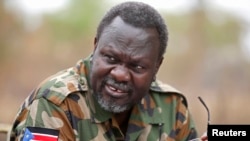The spokesman for South Sudan’s military is denying reports that government troops have lost Malakal after contact with officers was lost due to network problems, following clashes with rebels allied to former South Sudan vice president Riek Machar.
Colonel Philip Aguer also denied reports that the Sudan People’s Liberation Army (SPLA) plans to attack Pariang, a village close to the Sudan border, believed to be one of the hideouts of Mr. Machar.
“It was not losing contact because of anything. The network in Malakal is not working and we were simply unable to trace our people, but we are in contact with them,” said Aguer. “We have not lost control of Malakal. Malakal is now being fought for. The SPLA is controlling the northern part of Malakal town and the rebels and armed civilians are in the southern part of the town.”
Both the government and the rebels accuse each other of violating the cessation of hostilities agreement signed between the two groups at peace negotiations in Ethiopia.
News reports say the SPLA attacked the rebels in Leer, the birth place of Machar two days after the cease-fire was signed in neighboring Ethiopia. But, Aguer says the rebels are to blame for attacking the army positions.
“The SPLA was around the areas of Leer before the cessation of hostilities. The force in [national army] Division four was divided [and] most of them joined the rebels so that that is not true that the SPLA did not respect the cessation of hostilities agreement,” said Aguer.
He says the rebels are to blame for their refusal to abide by the stipulations of the cease-fire agreement.
“We are respecting the cessation of hostilities agreements that are being initiated by the AU [African Union],” said Aguer. “The rebels in Upper Nile publicly declared that they are not working with the cessation of hostilities agreement. That is a clear disregard to the cessation of hostilities agreement.”
Aguer also denied reports that the Sudan People’s Liberation Army (SPLA) plans to attack Pariang, a village close to the Sudan border, believed to be one of the hideouts of Mr. Machar.
“How could SPLA attack Pariang? Pariang is in the hands of the SPLA since the rebellion. The rebels attacked Pariang more than 10 times. Maybe somebody is talking of something they don’t know,” he said.
Aguer also says the government remains committed to the cessation of hostilities agreement in spite of criticism that the national army has been undermining the agreement.
“This is why we requested that the mediators in Addis Ababa should have a monitoring mechanism so that they don’t allow the rebels to say whatever they are saying, which is unrealistic,” said Aguer.
Colonel Philip Aguer also denied reports that the Sudan People’s Liberation Army (SPLA) plans to attack Pariang, a village close to the Sudan border, believed to be one of the hideouts of Mr. Machar.
“It was not losing contact because of anything. The network in Malakal is not working and we were simply unable to trace our people, but we are in contact with them,” said Aguer. “We have not lost control of Malakal. Malakal is now being fought for. The SPLA is controlling the northern part of Malakal town and the rebels and armed civilians are in the southern part of the town.”
Both the government and the rebels accuse each other of violating the cessation of hostilities agreement signed between the two groups at peace negotiations in Ethiopia.
News reports say the SPLA attacked the rebels in Leer, the birth place of Machar two days after the cease-fire was signed in neighboring Ethiopia. But, Aguer says the rebels are to blame for attacking the army positions.
“The SPLA was around the areas of Leer before the cessation of hostilities. The force in [national army] Division four was divided [and] most of them joined the rebels so that that is not true that the SPLA did not respect the cessation of hostilities agreement,” said Aguer.
He says the rebels are to blame for their refusal to abide by the stipulations of the cease-fire agreement.
“We are respecting the cessation of hostilities agreements that are being initiated by the AU [African Union],” said Aguer. “The rebels in Upper Nile publicly declared that they are not working with the cessation of hostilities agreement. That is a clear disregard to the cessation of hostilities agreement.”
Aguer also denied reports that the Sudan People’s Liberation Army (SPLA) plans to attack Pariang, a village close to the Sudan border, believed to be one of the hideouts of Mr. Machar.
“How could SPLA attack Pariang? Pariang is in the hands of the SPLA since the rebellion. The rebels attacked Pariang more than 10 times. Maybe somebody is talking of something they don’t know,” he said.
Aguer also says the government remains committed to the cessation of hostilities agreement in spite of criticism that the national army has been undermining the agreement.
“This is why we requested that the mediators in Addis Ababa should have a monitoring mechanism so that they don’t allow the rebels to say whatever they are saying, which is unrealistic,” said Aguer.





